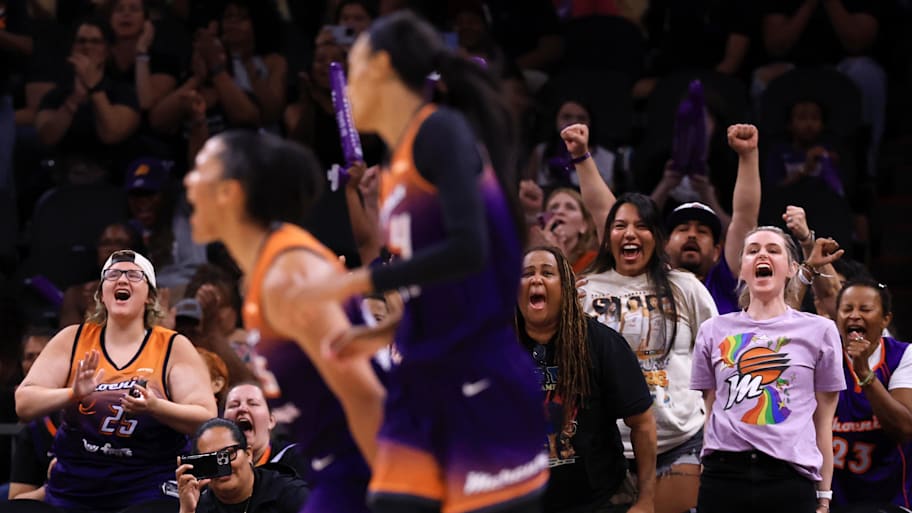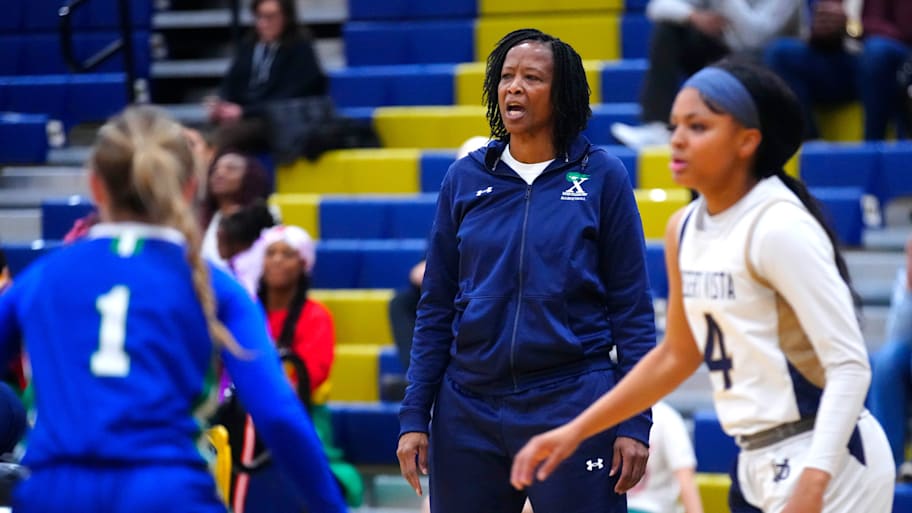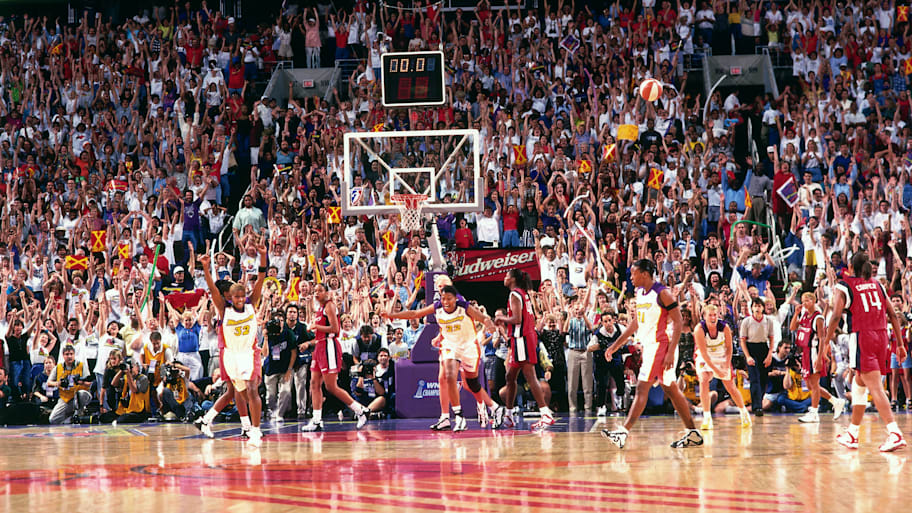
The Mercury desperately need an x-factor. Down 0–2 to the Aces in the WNBA Finals, the best-of-seven series heads to Phoenix. Luckily for the Mercury, they will be met in The Valley by some 17,000 passionate and raucous bodies eager to help their cause in Game 3. Phoenix isn’t home to an x-factor, but rather, the X-Factor—as the team’s loyal and potent fan base is aptly called.
On Wednesday night, PHX Arena will be filled with supporters and the sounds of a familiar rallying cry. “Miiiiighty Mercury,” a female voice booms out of the loudspeaker. Fans, having committed the lyrics to memory, join in a call and response, belting the Mercury’s infamous fight song. The creator and singer of the team’s rousing chant looms large over Phoenix home games as her jersey sways over the court, having been retired by the franchise in 2002. Jennifer Gillom, who played for the Mercury for six seasons starting in 1997, is the architect behind Phoenix’s endlessly catchy cheer—and she’ll be in the building with the rest of the X-Factor for Act III of the WNBA Finals.
According to the former All-Star, the song originated nearly 30 years ago, around the 1997 season, when she and teammate Bridget Pettis were simply joking around. The tune was inspired by a chant WNBA and USA Basketball star Ruthie Bolton’s family sang for her, deeming her “Mighty Ruthie” following the ’96 Olympics. Gillom adapted the rhythm to include lyrics that fit the Mercury, and the rest was history.
“I just belted it out and Bridget was like, ‘Dang, you got a voice,’ ” says Gillom. “It was a song that really motivated us, you know. It was kind of like our inspirational song in practice, in the locker room, which then became the theme song for our games.”
Breaking out into song was a common occurrence for Gillom, who sang in her church choir growing up. Throughout her career, she’d entertain her various teams with a spontaneous show.
“I would sing for the team not only as a player, but as a coach,” says Gillom, who had various coaching roles with the Lynx, Sparks, Mystics and Sun after her playing days. “I would get on and just grab a mic and start singing. Even when I was [playing] overseas, they loved it. I always loved singing, but I was just too shy to sing out in public.”

Back then, she may have been too reserved to perform publicly, but Gillom’s voice now serves not only as the soundtrack to Mercury games but also appears all over TikTok and Instagram. As Phoenix charged into the postseason, the team’s fight song went viral on social media. Gilom, now the women’s basketball coach for Xavier College Preparatory, a Catholic high school in Phoenix, was informed of the song’s online presence by her players.
“My kids at school love that song. They have been playing that song every single day,” says Gillom. “We came to some [Mercury] games and they would sit in the stands and they would count how many times it would play during the game.”
Two of the students she now coaches, she says, are actually the children of Maggie Cloud, who
served as the Mercury’s hip-hop squad director while Gilom was a player. It’s one of many full-circle moments the song has brought about. Her players’ reaction to the chant, and its longevity, has elicited a sense of pride in Gillom.
“To me, it’s comparable to having my jersey hanging in the rafters,” she says. “It lives on, and it’s going to continue to live on because it’s such a song that reflects the Mercury organization, the Mercury attitude, everything about the Mercury. And I just think, as long as the WNBA team is around, my voice will live on in that arena.”

The original chant may have undergone a refresh and been updated with a hip-hop beat, but the core tenets of the cheer that Gillom constructed are still there. The lyrics are fitting for the various iterations of the Mercury, which share a cogent through line.
Gillom says the 2025 Phoenix team reminds her a lot of the 1998 squad that she led. Similarly, Gillom & Co. faced a dynastic foe, the Houston Comets, in the Finals. Many didn’t expect the ’98 Mercury to make it that far (just as the group in this year’s Finals may have been underestimated), but they had a never-quit, hard-working attitude that she recognizes in the current team. This continuity in team culture across decades is perhaps another factor contributing to the “Mighty Mercury” song’s enduring charm.
“To me, that word ‘mighty’ is great. I just think it’s the perfect title for the great teams that play for the Mercury, including today, they’re just so resilient,” says Gillom.
And the Mercury will have to muster all their might Wednesday. With their backs against the wall, Game 3 is essentially a must-win scenario. Gillom, who says she enjoyed sellout crowds during her playing days in Phoenix, argues that the influence of the X-Factor can’t be underestimated.
“It literally makes you play above and beyond the level that you’re capable of playing, especially in those moments where you feel like … you just can’t, because that X-Factor is just there, and they’re just pushing you, and they’re just giving you that extra power that you need to finish a game,” she says.
Gillom’s voice has served as the score for various eras in Phoenix, from the debut seasons to the championship runs of the mid-aughts to the resurgence in 2014. Now, a new group of players will look to etch their names into Mercury history. To do that, Alyssa Thomas, Kahleah Copper, Satou Sabally and the rest of the team will hope to hear Gillom’s chant at the end of Wednesday night, leading a victory chorus, signaling another Mercury win.
More WNBA Playoffs on Sports Illustrated
This article was originally published on www.si.com as The Catchy Rallying Cry That Could Be the Mercury’s X-Factor in the WNBA Finals.







